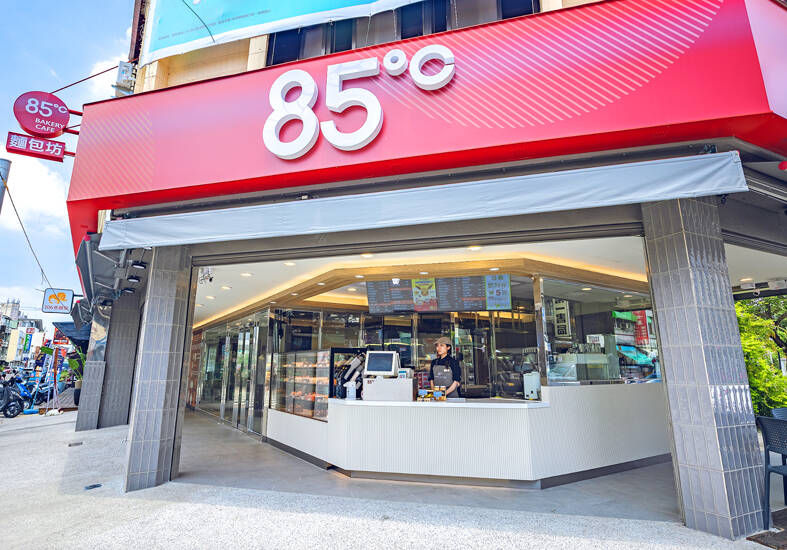Gourmet Master Co (美食達人), which operates cafe and bakery chain 85°C (85度C) in Taiwan and overseas, yesterday said it shut down 14 outlets in China last quarter to cope with the vast consumer market’s lackluster recovery in the post-COVID-19-pandemic era.
Gourmet Master sought to play down the move as normal business adjustments to keep its economic scale optimal, rather than massive closures or intentions to pull out of China, its largest source of revenue.
Revenue contributions from China grew 3 percent in the first three quarters of this year, although its overall share declined to 51 percent from a peak of 72 percent in 2014, it said.

Photo courtesy of Gourmet Master Co
“It is common for restaurant brands to adjust product lines and portfolios to strengthen operational efficiency in a competitive market such as China,” the company said.
Gourmet Master said it reviews the financial performance of every outlet on a quarterly basis.
The Chinese market lagged behind expectations after emerging from pandemic restrictions, but the company would not abandon the market it entered in 2007, it said.
As of September, Gourmet Master operated 440 stores in Taiwan, 71 in the US, six in Hong Kong and 575 in China.
Analysts said Gourmet Master might shut another 15 shops in China this quarter and stand by a cautious approach next year to improve its profitability.
Sales in China last month declined 5.8 percent year-on-year to NT$1.6 billion (US$50.88 million) but expanded by double-digit percentages in the US market, company data showed.
The figures indicated that operations in China have dragged on profits for the company, which said it had no expansion plans in the country while customers remain conservative about spending.
Net profit increased 38.62 percent year-on-year to NT$228.66 million during the July-to-September period, or earnings per share (EPS) of NT$1.27. Cumulative net profit in the first three quarters more than doubled to NT$741.28 million, or EPS of NT$4.12.
In contrast to China, Gourmet Master said it would open new stores in the US from this quarter, as operations there have a higher profit margin over its Chinese and Taiwanese operations.
Net profit for the US market last quarter rose 18 percent annually to NT$1.78 billion.
“That market still poses ample growth potential,” it said.

When an apartment comes up for rent in Germany’s big cities, hundreds of prospective tenants often queue down the street to view it, but the acute shortage of affordable housing is getting scant attention ahead of today’s snap general election. “Housing is one of the main problems for people, but nobody talks about it, nobody takes it seriously,” said Andreas Ibel, president of Build Europe, an association representing housing developers. Migration and the sluggish economy top the list of voters’ concerns, but analysts say housing policy fails to break through as returns on investment take time to register, making the

‘SILVER LINING’: Although the news caused TSMC to fall on the local market, an analyst said that as tariffs are not set to go into effect until April, there is still time for negotiations US President Donald Trump on Tuesday said that he would likely impose tariffs on semiconductor, automobile and pharmaceutical imports of about 25 percent, with an announcement coming as soon as April 2 in a move that would represent a dramatic widening of the US leader’s trade war. “I probably will tell you that on April 2, but it’ll be in the neighborhood of 25 percent,” Trump told reporters at his Mar-a-Lago club when asked about his plan for auto tariffs. Asked about similar levies on pharmaceutical drugs and semiconductors, the president said that “it’ll be 25 percent and higher, and it’ll

NOT TO WORRY: Some people are concerned funds might continue moving out of the country, but the central bank said financial account outflows are not unusual in Taiwan Taiwan’s outbound investments hit a new high last year due to investments made by contract chipmaker Taiwan Semiconductor Manufacturing Co (TSMC, 台積電) and other major manufacturers to boost global expansion, the central bank said on Thursday. The net increase in outbound investments last year reached a record US$21.05 billion, while the net increase in outbound investments by Taiwanese residents reached a record US$31.98 billion, central bank data showed. Chen Fei-wen (陳斐紋), deputy director of the central bank’s Department of Economic Research, said the increase was largely due to TSMC’s efforts to expand production in the US and Japan. Investments by Vanguard International

WARNING SHOT: The US president has threatened to impose 25 percent tariffs on all imported vehicles, and similar or higher duties on pharmaceuticals and semiconductors US President Donald Trump on Wednesday suggested that a trade deal with China was “possible” — a key target in the US leader’s tariffs policy. The US in 2020 had already agreed to “a great trade deal with China” and a new deal was “possible,” Trump said. Trump said he expected Chinese President Xi Jinping (習近平) to visit the US, without giving a timeline for his trip. Trump also said that he was talking to China about TikTok, as the US seeks to broker a sale of the popular app owned by Chinese firm ByteDance Ltd (字節跳動). Trump last week said that he had